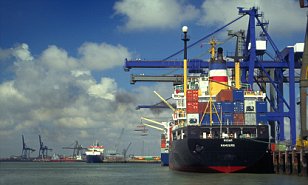Blame the Brexit vote, not a clumsy trader for the falling pound, says SIMON WATKINS
Perhaps the slump in the pound is a one-off fluke, a moment of madness caused by a deranged computer program or a fat-fingered trade by a clumsy trader.
That may account for the sudden and sharp crash in sterling in Asia late on Thursday night.
It does not account for the longer downward trend in the value of the pound, which accelerated even in the cold light of Friday morning. This is the cost of Brexit.
A drop in the value of the pound is good news for exporters as optimists are keen to mention, but it adds to the cost of anyone importing raw materials to the UK and will eventually feed through into higher consumer prices on imported goods.

The cost of Brexit: The pound's devaluation, which has accelerated
The FTSE 100 continues to rise as an index, but a cursory look at the movements in individual companies shows that those most exposed to the UK economy and which earn their revenues in sterling (British retailers and housebuilders for example) fell last week and many are still far below pre-referendum levels.
It is no coincidence that the recent market turmoil has followed the Conservative Party Conference, where Theresa May set a date to trigger Article 50.
The past three months have been a phoney war in which the weaker pound and lower interest rates have buoyed industry, but before the real task of leaving the EU has begun.
It is easy to forget that David Cameron promised that in the event of a Leave vote, he would expect to trigger Article 50 'straight away'. That might explain why so many forecasters predicted a nasty and immediate shock to the economy.
But, of course, David Cameron did not trigger Article 50 immediately – he resigned and left that step to his successor, who has only just set a date for that momentous act.
That delay may go quite a way to explaining why the damage to the UK economy has been delayed. But we have a long, long way to go.
Openreach row reaches fever pitch
The row over whether BT should be forced to split off its Openreach broadband business is hitting fever pitch.
But I am not convinced forcing such a split would be a panacea for competition in the telecoms market. Nor am I convinced that Britain's economy is being hampered by slow broadband roll-out.

The row over whether BT should be forced to split off its Openreach arm is hitting fever pitch
Far more meaningful to consumers is this weekend's news that phone groups have agreed to stop charging fees to unlock contract mobile phones.
In a single step, it becomes far easier for mobile customers to quit a phone contract, keep their handset and move to another deal.
According to Ministers, it will save consumers £48million a year. With the cost of a holiday and imported goods about to rise, consumers can do with every break they can get.
-
 RBS destroyed customers' businesses for profit and rewarded...
RBS destroyed customers' businesses for profit and rewarded...
-
 I went to buy something on BHS online but spotted two...
I went to buy something on BHS online but spotted two...
-
 Are card firms are putting YOU at risk online as they scale...
Are card firms are putting YOU at risk online as they scale...
-
 Bank accounts are closed by 'kangaroo courts' says TONY...
Bank accounts are closed by 'kangaroo courts' says TONY...
-
 Banksy has turned spray painting into an art form worth a...
Banksy has turned spray painting into an art form worth a...
-
 Land Rover love-in: RAY MASSEY finds out why people are...
Land Rover love-in: RAY MASSEY finds out why people are...
-
 Over-55s in England have more wealth locked away in their...
Over-55s in England have more wealth locked away in their...
-
 The big squeeze: Britons face a cut in real wages as...
The big squeeze: Britons face a cut in real wages as...
-
 Confused about 'hard' and 'soft' Brexit, the Norway model...
Confused about 'hard' and 'soft' Brexit, the Norway model...
-
 FTSE CLOSE: Footsie extends gains on oil price rally after...
FTSE CLOSE: Footsie extends gains on oil price rally after...
-
 Big Four supermarkets lose £5 to £7 on every online order:...
Big Four supermarkets lose £5 to £7 on every online order:...
-
 'If I have money, I always buy property' says Loose Women's...
'If I have money, I always buy property' says Loose Women's...


























































